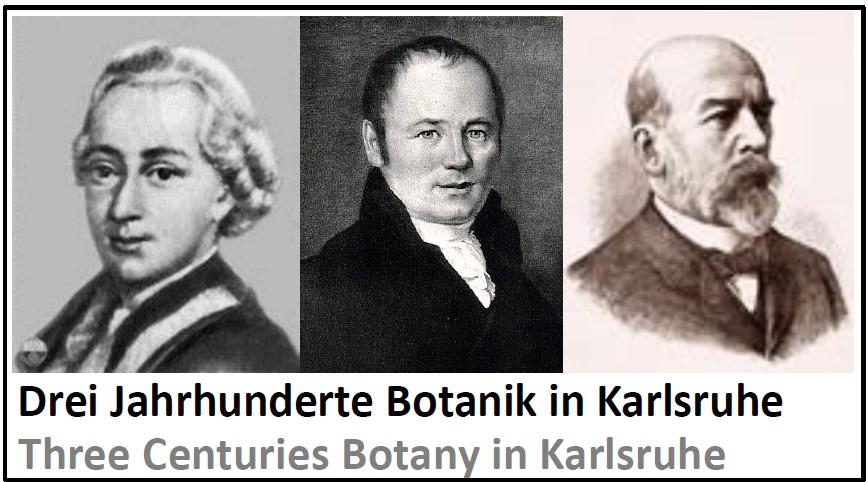Botany in Karlsruhe - 300 Years of Science and Society
↵
|
|
Botany in Karlsruhe - Always in the Heart of TimeKarlsruhe is usually linked with the Polytechnikum that later became the Technical University and finally the KIT. Only few know that the history of plant sciences is much older. Its beginnings predate even the foundation of the city. Already in the 17. century Duchesse Sybilla Augusta began to systematically explore the use of plants and by this founded a family tradition, where plants and botany always played an important role. The city was still in the making, whe the Botanical Garden already became the cradle of scientific breakthroughs. more...
KölreuterBotanist Joseph Gottlieb Kölreuter became not only the first scientific director of the Botanical Garden, but also began in the so-called Kitchen Garden to do experiments on inheritance and by this laid the ground for a scientific discipline that nowadays shapes current biology under the name of genetics. His simple, but insightful crossing experiment, by which he demonstrated that both parents contribute symmetrically to inheritance and not only the fathers, as was the general belief in those days, is so important that we have reconstructed it as demonstration experiment. After many numerous attempts, he found two species of wild tobacco that differed in flower shape and were nevertheless crossable. By this, e could show that the offspring carried the traits of both parents. This experiment was not only awarded by an Award by the Russian Tsar Katharina the Great, but also marks the starting point of genetics as a science. More than a century later Gregor Mendel extracted from Kölreuter´s work (which he quoted extensively in his famous paper) the idea that symmetric inheritance also implies that all traits must exist in two copies, which was the key to understand, how a trait from one parent might be masked by the trait from the other parent. It will then be inherited, but first remain invisible. Mendel used the term of "invisible characters".
GmelinThe 19. century began with turmoil and crisis - the French Revolution had shattered the old Europe, the Napoleonic Wars annihilated entire states and created new ones. Climatic crises, such as the "Year without Summer" (1816) accentuated the problems. Carl Christian Gmelin was not only the director of the Botanic Garden and therefore in charge of Kölreuter's legacy, he also founded the Natural History Museum. He saw science in the service of society and investigated new forms of utilising regional plants to cope with economic crisis. Many of his ideas are currently revived under the name of Bio-Economy. more...
BlankenhornThe rapid rise of America shattered also the South of Germany. The consequences of globalisation were also of botanical nature. New plant diseases were spread and provoked immense crisis and turmoil. Potato Blight made one million Irishmen and -women starve to death and drove further three millions into emigration, the Grapevine Louse destroyed more than half of the European vineyards and temporarily stopped viticulture in Baden. Also from here, hundred thousands of migrants set off for the US. Also the failed revolution of 1848 forced people into emigration, among them the Baden revolutionary Friedrich Hecker, who finally settled in the US and started viticulture. He observed that American wild Grapevines were immune and convinced, over years of correspondence, Adolph von Blankenhorn working at the TU Karlsruhe as assistant to Leonhard Roesler on wine chemistry, to test the meanwhile common grafting of vines on a louse-resistant rootstock. He even sent him seeds of a natural hybrid that was resistant. When Roesler, disappointed by the lacking support of the Baden government, went to Klosterneuburg in Austria, Blankenhorn founded a private enological research institute, the first viticulture research institute, at least in Germany. His mission was to put viticulture on a scientific base. This was a success story - the grafting of grapevine represents the globally most important case of biological pest control, the breeding of PiWi varieties (for pilzwiderstandsfähig or fungus rsistant) allows to reduce fungicide load to a fraction of the usual, and viticulture research institutes exist meanwhile in all States, where wine is produced. Also the neighbouring countries adopted this idea, to join science and practical application. more...
|

